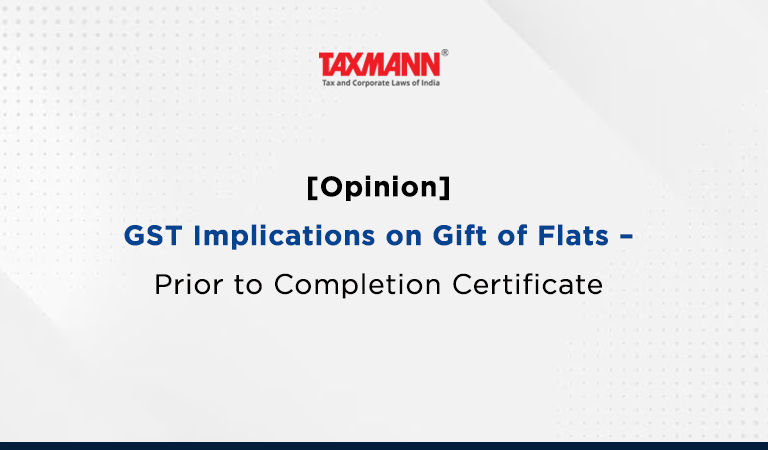[Opinion] GST Implications on Gift of Flats – Prior to Completion Certificate
- Blog|News|GST & Customs|
- 3 Min Read
- By Taxmann
- |
- Last Updated on 14 April, 2023

CA Sri Harsha – [2023] 149 taxmann.com 208 (Article)
In this article, we shall analyse an important aspect relating to the tax implications under the GST laws, on gifts made to related parties of flats in a residential or commercial complex, prior to obtaining completion certificate. We shall take a case study to analyse the tax implications.
Let us say, a landowner, Mr X has entered a development agreement with a developer, M/s ABC. The development agreement is entered on 01 April 2022, for conceiving a commercial project. Vide the terms of the development agreement, Mr X is entitled a total of 2 lakhs Sft1, out of the total 5 lakhs Sft of the project.
Mr X in April 2023 executed a gift deed to his brother, divesting himself of all the rights pertaining to 5,000 Sft, out of his total entitlement of 2 lakhs Sft. Mr X has executed a gift deed in favour of his brother qua 5,000 sft. The gift deed, inter-alia, clearly stipulates that the above property is under construction and on completion of such construction by developer in terms of development agreement, the brother would get the possession. Further, the gift deed states that Mr X has gifted this out of love and affection towards his brother.
Now, the question, which is the subject of this article, what are the tax implications under the provisions of CGST Act2 on such gift? If the gift deed is executed post obtaining the completion certificate of the project, then, I think, everyone would agree, the said gift would be a gift of immovable property being flats, and accordingly not a subject matter of GST laws. However, if the gift deed is executed prior to the obtaining of completion certificate, what would be the tax implications? Would the same be subjected to tax or would it be indifferent, when the gift deed is executed, whether pre or post completion certificate, since what was gifted is an immovable property and consequently should be out of the tax net. Let us proceed to examine the same.
At first blush, the question seems to be easy. Since, what is being gifted are the flats and a gift deed is executed in the manner provided in Section 123 of Transfer of Property Act, 1882 and which is registered in terms of Section 17 of Registration Act, 1908, should not invite an examination under the GST laws. However, on a detailed examination, we may reach to the same conclusion, that the gift is not taxable, but the means to reach such end is not an easy thing. Before we proceed further, a bit of basics provides us the right perspective.
Section 7 of CGST Act deals with the scope of supply. As per Section 7(1)(a), all forms of supply of goods or services or both such as sale, transfer, barter, exchange, license, rental, lease or disposal made or agreed to be made for a consideration by a person in the course of furtherance of business are covered within the ambit of supply. Once a transaction or activity falls under the scope of ‘supply’, then in terms of Section 7(1A), they shall be treated either as goods or services as mentioned in Schedule II. Section 7(2)(a) states that notwithstanding anything contained in Section 7(1), activities or transactions specified in Schedule III shall be neither treated as supply of goods nor services.
On a detailed examination, Section 7(1)(a) states that all forms of supply of ‘goods or services or both’ made or agreed to be made for a ‘consideration’ ‘in the course of furtherance of business’ would qualify to be supply. Hence, in order to fall under the ambit of supply, the subject item should be either ‘goods’ or ‘services’ or ‘both’ and should be made for a consideration and that should be in the furtherance of business.
In the case study taken above, Mr X has gifted flats to his brother. Let us examine, whether the said transaction or activity, satisfies, the three conditions for qualifying to be a supply.
Click Here To Read The Full Article
Disclaimer: The content/information published on the website is only for general information of the user and shall not be construed as legal advice. While the Taxmann has exercised reasonable efforts to ensure the veracity of information/content published, Taxmann shall be under no liability in any manner whatsoever for incorrect information, if any.

Taxmann Publications has a dedicated in-house Research & Editorial Team. This team consists of a team of Chartered Accountants, Company Secretaries, and Lawyers. This team works under the guidance and supervision of editor-in-chief Mr Rakesh Bhargava.
The Research and Editorial Team is responsible for developing reliable and accurate content for the readers. The team follows the six-sigma approach to achieve the benchmark of zero error in its publications and research platforms. The team ensures that the following publication guidelines are thoroughly followed while developing the content:
- The statutory material is obtained only from the authorized and reliable sources
- All the latest developments in the judicial and legislative fields are covered
- Prepare the analytical write-ups on current, controversial, and important issues to help the readers to understand the concept and its implications
- Every content published by Taxmann is complete, accurate and lucid
- All evidence-based statements are supported with proper reference to Section, Circular No., Notification No. or citations
- The golden rules of grammar, style and consistency are thoroughly followed
- Font and size that’s easy to read and remain consistent across all imprint and digital publications are applied



 CA | CS | CMA
CA | CS | CMA
